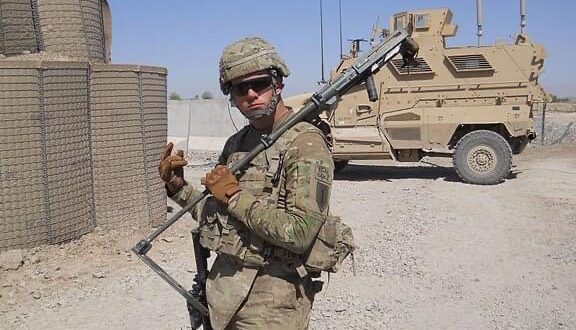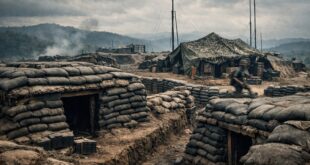by Heath Hansen
This dude was shot 10 times, and lived to sing about it…
Recently I was asked if I’d like to sit down and talk with a rising star in the country music industry; a singer who also happens to be a former infantryman in the US Army. Being a fan of country music, and a former infantryman myself, I naturally jumped at the opportunity.
When we meet, Scotty Hasting is wearing a black cap that reads, “Grateful.” He’s a big boy, probably pushing 230 pounds; but this dude’s corn-fed, and looks like he has the strength to toss a cow into the back of a pickup truck with his bare hands. He has a thick, well-trimmed beard, and penetrating blue eyes. As I get to know Scotty, I realize this guy sings with a deeper purpose…
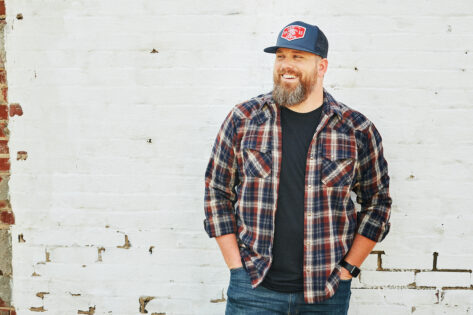
Soldier of Fortune: Scotty, tell me about yourself, and your time in the Army.
Scotty: So, I joined the Army in 2010, and went to basic, and infantry school, at Fort Benning. After graduation, I received orders to 4th Squadron, 4th Cavalry Regiment, in the 1st Infantry Division. I was part of “the Big Red One.” After arriving at my unit, we had a train-up, and ended up deploying to Afghanistan in February of 2011. My unit’s area of operations was in Kandahar Province.
Soldier of Fortune: Kandahar was an area well-known for enemy activity. What was your position in the squad?
Scotty: I was a Vallon Operator. So, basically, I was a PFC rifleman, carrying an M-4, but I was also the guy who goes to the front of the element with a metal detector, and looks for Improvised Explosive Devices (IED’s).
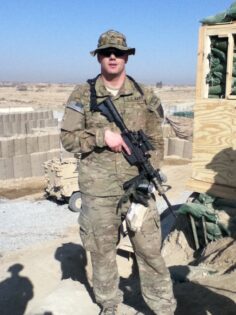
Scotty in the ‘Stan
Soldier of Fortune: Tell me about your injuries. How did that go down?
Scotty: So, on April 21, 2011, we were out on patrol, and like I mentioned, I was the guy at the front of the element looking for IED’s. Because I was holding the metal detector, my M-4 was slung across my chest. We made contact, and I got shot before I even had a chance to grab my rifle. Two rounds went through my weapon and into my chest plate.
I ended up being shot ten times in total. Five rounds went into my shoulder, four rounds went into my hip, and one hit my thigh. I don’t even bother counting the two that hit my body armor; ten bullets is enough! Haha!
Soldier of Fortune: Wow! You actually took 10 rounds and survived! What happened next?
Scotty: I got MEDEVACed out of there and we actually had to make an emergency stop in Bagram because they lost pulse in my right arm. They thought they were going to have to take my arm. They missed this little nick in one of my main arteries that ran into my arm, so they took a vein from my right leg and put it into that artery. It was wild. Then from Bagram, I went to the medical center at Landstuhl, and later flew to Walter Reed.
I was an inpatient at Walter Reed for a month, where every other day, I would be put under anasthesia and have my wounds cleaned. They put me to sleep because the pain would otherwise be too intense. It was kind of a blur for a while. While we were doing that, I would have physical therapists and occupational therapists come in and try to help with my hand. Because I got shot in the brachial plexus, my nerves never fully connected back to the small muscles, so three of my fingers stay in a claw. Now I strap a pick to my thumb to strum the guitar.
After that month, I was moved to outpatient care, where I lived on campus and went to appointments every day. It’s kind of set up like a college campus where you and your family are in a dorm room. That’s your whole job in the Army at that point – just go to appointments and try to get better, or as good as you can get. Most people, when they go to Walter Reed, are eventually medically retired. A lot of people at Walter Reed aren’t going to be going back into service.
Eventually, my guys were coming back, and I wanted to return to Fort Riley to be there when they arrived. But, it took an act of Congress, literally. I had to go to my congressman, and he had to write a letter about me saying, ‘Hey, let him go back to his unit and see his friends.’ The chain of command at Walter Reed had never seen that before. Normally people who are at Walter Reed get out (of the service) at Walter Reed, and that’s it. The cool part was that luckily, my congressman was an ex-Ranger, so he completely understood. He was like, ‘Yeah, absolutely. You need to be back there.’
I went back to Fort Riley and I was there for four years fighting the medical evaluation board process. I didn’t want to med-board. I wanted to go back on active duty. I wanted to go back to a line unit, and I fought like hell to try to make that happen. Whenever you try to go back into service, they make you do a mental and physical evaluation to see if you can still do the job. I failed the physical evaluation four different times. On the fourth time, they were like, ‘Listen, we need to figure it out.’ That’s when they gave me the paper that had all of these other jobs that I could do, but none of them were to fight, and that’s what I signed up for. After that, I was like, ‘Okay, then I need to get out.’ When I signed up, I signed up to be what my idea of a soldier was, which was fighting the bad guys. The moment that they said I couldn’t do this job anymore, and the other jobs were sitting behind a desk, I knew that’s not what I wanted to do. I was officially medically retired in January of 2015, after a total of five years in service.
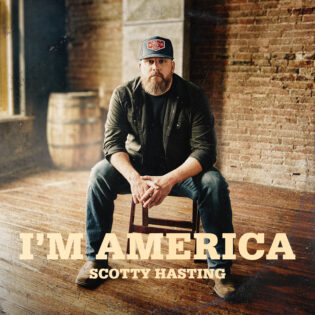
Soldier of Fortune: Your dedication to the Army is really incredible. At what point did you realize you had a passion for making music?
Scotty: I grew up in the Northern Kentucky/Cincinnati area and I’ve been singing ever since I was a kid. It’s super stereotypical because I’m a Country artist, but I grew up in church singing in choirs. Singing for me was always kind of a hobby. It was my happy place. It was a place for me to escape into. As I said, singing was a hobby – music was a hobby. I didn’t really get into thinking, “Oh, this is going to be a career” until COVID hit.
I shot archery for about five years, but then COVID hit, and archery shut down – the world shut down. Things got quiet. When things get quiet, the demons knock the loudest, and COVID was very quiet. I needed something to get out of my head, I needed something to escape into. I always had a guitar sitting in the corner of my room, and I decided that I was going to learn how to play. I jumped on YouTube and started learning. I found an escape and a little bit of peace in that. And then I was like, “Well, I have all of these feelings and thoughts that are about to overflow the cup, so to speak.” I wanted to get it out of me and put it somewhere. That was when I jumped on YouTube and started learning how to write songs. I learned how songs are structured – this should go here, and this should go here, and that was when I started writing songs. I found a little bit of escape and a little bit of peace in that, and then one day, the world started opening up again. I had all these songs that I had grown up listening to that I now knew how to play.
I had these original songs that I’d written that were just feelings. I didn’t really know if I wanted anyone to hear them yet, but I was going to go out to this open mic and just play. I learned this new skill – playing music and learning songs – and I wanted to go try it. There was an open mic night in Cookeville, Tennessee, and I was like, “Well, let’s go. Why not? What do I have to lose?” I went up there and played the first song I ever learned how to play, which was “Should’ve Been a Cowboy” by Toby Keith.
At that moment, I knew that was what I needed to do forever. I needed to be on a stage. The escape and peace that I found in archery and songwriting and learning how to play the guitar was magnified 100 times when I was on stage. I lived for that. Then I started bugging the crap out of everyone down here in Nashville because I knew that on Broadway, you play three to four hours at a time. So if I can get three to four hours of peace and quiet from the PTSD, the depression, the anxiety that I deal with, if I can get three to four hours of that being gone, I want that. I started playing five to six nights a week. My vocal cords hated me, naturally. But for me, it was worth it because I was able to escape and find peace in those three to four hours a day. It has since blossomed because of a weird coincidence of meeting the son of the president and CEO of Black River Entertainment, and him hearing my story in some of my music. And now here I am, a signed artist with Black River Entertainment and playing all over the world.
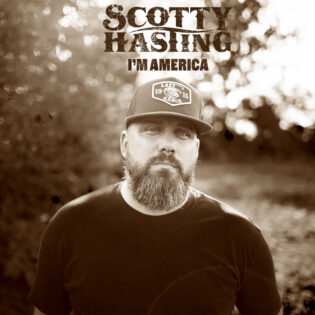
Soldier of Fortune: What is your mission now? What is the mission behind your music? I know you’re a rising star, but have you been able to remain accessible to the guys you served with, on those days that they just need to hear a familiar voice?
Scotty: From the very beginning, before really getting into the music business, I met with Black River and said, “I don’t care about being famous. I don’t care about making a buttload of money. All I care about is that the right person hears my song, and it makes them want to put the gun down.” From the very beginning, that’s what it’s been, and that’s what it will always be. In order for that to happen, not only do I have to write and record songs that are my vulnerability, and my heart and soul, but I also have to be incredibly accessible to people that need to hear that message. It has to be that way for what we’re trying to do, with the mission that we’re trying to accomplish. I want for someone to message me and feel like they’re actually talking to someone who’s been there, and someone who understands. That is such an important part of what we’re doing and what I’m doing. I’m incredibly lucky that I have a team and a family here at Black River that understand that, and want to help me accomplish that.
Soldier of Fortune: Thank you for sitting down with Soldier of Fortune and telling us your story! We support your mission and wish you the best of luck, Scotty!
See Scotty July 3rd at the Hometown Throwdown with Chris Lane at Badger Park – Shullsburg, WI!
Find him on Facebook, TikTok, on his YouTube channel, and at his website.
Heath Hansen writes frequently for Soldier of Fortune. See more of his work, here.
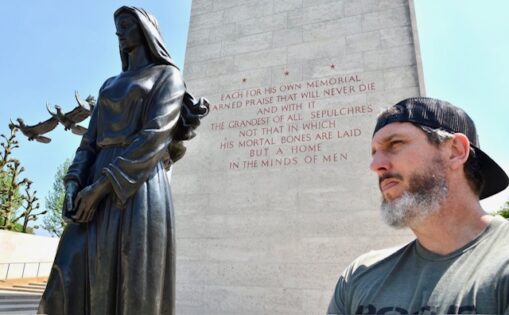
Netherlands American
Cemetery in Margraten.
 Soldier of Fortune Magazine The Journal of Professional Adventurers
Soldier of Fortune Magazine The Journal of Professional Adventurers


